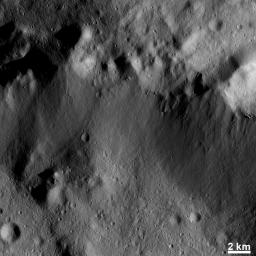
|
Mass Wasting on Steep Slopes
- Click the image above for a larger view
- Full-Res JPEG (1024 x 1024) (196.7 kB)
- Full-Res TIFF (1024 x 1024) (1.1 MB)
Caption:
This Dawn FC (framing camera) image shows many highly degraded craters in the top part of the image. These craters are roughly 4 kilometers (3 miles) in diameter and are so degraded that their rims are only partially visible. They are highly degraded because material has been lost down the steep slope below them. Downslope movement of material such as this is called mass wasting. The mass wasted material in this image is relatively smooth and is located on the slope that runs roughly horizontally across the image. The mass wasted material is sparsely cratered, unlike the other areas visible in the image. Mass wasting happens on steep slopes, which can occur along the sides of elongate depressions, called graben, and on the sides of craters.
This image is located in Vesta's Rheasilvia quadrangle and the center of the image is 80.4 degrees south latitude, 296.5 degrees east longitude. NASA's Dawn spacecraft obtained this image with its framing camera on Dec. 13, 2011. This image was taken through the camera's clear filter. The distance to the surface of Vesta is 239 kilometers (149 miles) and the image has a resolution of about 22 meters (72 feet) per pixel. This image was acquired during the LAMO (low-altitude mapping orbit) phase of the mission.
Background Info:
The Dawn mission to Vesta and Ceres is managed by NASA's Jet Propulsion Laboratory, a division of the California Institute of Technology in Pasadena, for NASA's Science Mission Directorate, Washington D.C. UCLA is responsible for overall Dawn mission science. The Dawn framing cameras have been developed and built under the leadership of the Max Planck Institute for Solar System Research, Katlenburg-Lindau, Germany, with significant contributions by DLR German Aerospace Center, Institute of Planetary Research, Berlin, and in coordination with the Institute of Computer and Communication Network Engineering, Braunschweig. The Framing Camera project is funded by the Max Planck Society, DLR, and NASA/JPL.
More information about the Dawn mission is online at http://www.nasa.gov/dawn and http://dawn.jpl.nasa.gov .
Cataloging Keywords:
| Name | Value | Additional Values |
|---|---|---|
| Target | 4 Vesta | |
| System | Main Belt | |
| Target Type | Asteroid | |
| Mission | Dawn | |
| Instrument Host | Dawn | |
| Host Type | Orbiter | |
| Instrument | Framing Camera (FC) | |
| Detector | ||
| Extra Keywords | Crater, Grayscale | |
| Acquisition Date | ||
| Release Date | 2012-02-15 | |
| Date in Caption | 2011-12-13 | |
| Image Credit | NASA/JPL-Caltech/UCLA/MPS/DLR/IDA | |
| Source | photojournal.jpl.nasa.gov/catalog/PIA15381 | |
| Identifier | PIA15381 | |
